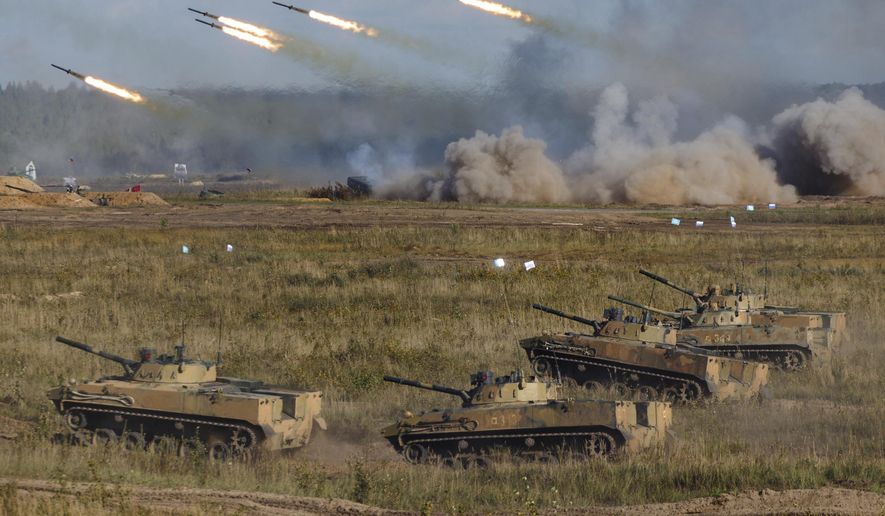The U.S. and its European partners have ruled out Russian security proposals that would limit NATO’s expansion, top Biden administration officials said Tuesday, as the two sides dig in ahead of a second round of meetings to resolve the military standoff in Ukraine and tensions all along Russia’s borders from the Baltics to the Black Sea.
While NATO allies have tried to maintain a united front in rejecting Moscow’s demands, the Kremlin sent its own clear signal to the West. Thousands of Russian troops reportedly held live-fire drills in western Russia near the border with Ukraine on Tuesday, stoking fears that Moscow is preparing for a full-scale invasion of its smaller neighbor if it doesn’t get the results it wants from this week’s diplomatic talks with the U.S. and NATO.
Those talks began with a bilateral U.S.-Russia meeting on Monday. They will continue Wednesday in Brussels as NATO officials meet with their Russian counterparts, and will conclude Thursday with talks hosted by the broader Organization for Security and Cooperation in Europe, where both Russia and Ukraine are members.
So far, however, it appears there’s little common ground between the two camps and few obvious reasons to expect a resolution to the crisis in the near future.
The government of Russian President Vladimir Putin is insisting that discussions must begin with assurances that the Western military alliance — formed to confront and contain the Soviet Union during the Cold War — won’t expand eastward to include former Soviet states Ukraine or Georgia. But with the U.S. and its allies already rejecting those ideas, it’s unclear what moves short of such a pledge will satisfy Mr. Putin.
“We obviously have to wait and see what the Russians say when they get to the table,” U.S. Ambassador to NATO Julianne Smith told reporters on a conference call Tuesday. “We don’t exactly know how they will approach the conversation. What I can tell you is in prior consultations and meetings with allies … it has become crystal clear that not a single ally inside the NATO alliance is willing to budge or negotiate anything as it relates to NATO’s open-door policy.”
SEE ALSO: North Korea’s second missile launch of new year feeds hypersonic fears
“I cannot imagine any scenario where that is up for discussion,” she said.
The Biden administration has expressed openness to negotiating on some Russian concerns, including missile deployments in the region and the scope of future U.S. military drills in eastern Europe. But the White House vehemently denied reports last weekend that it was willing to reduce America’s troop presence in the region.
The U.S. and NATO have stressed that any real negotiation must begin with Russia pulling back the 100,000 troops currently gathered along the Ukrainian border. Moscow’s military posture is fueling fears that Mr. Putin is preparing to once again seize Ukrainian territory through force, just as he did with the Crimean Peninsula in 2014.
The West has threatened an unprecedentedly harsh new round of economic sanctions against Russia should it proceed with an invasion of its neighbor.
“If Russia pursues confrontation, there will be serious consequences,” Ms. Smith said.
But Moscow already is signaling that it may soon pull the plug on diplomacy. Kremlin spokesman Dmitry Peskov told reporters Tuesday that Russia isn’t interested in lengthy negotiations that don’t produce results, seemingly rejecting broad talks over new nuclear weapons treaties or other long-term matters the U.S. hoped to broach during this week’s meetings.
“So far, let’s say we see no significant reason for optimism,” Mr. Peskov told reporters Tuesday.
Meanwhile, Russian military officials said that at least 3,000 troops and 300 armored vehicles participated in major drills in the Voronezh, Belgorod, Bryansk and Smolensk regions of Russia, near Ukraine. The timing of those drills is almost surely meant to convey that Russia remains serious about taking military action in Ukraine unless its security demands are met.
Back in Washington, there’s strong bipartisan support for the administration’s hard line against Russian demands.
“We support close engagement with our allies to ensure a coordinated and unambiguous response to Putin’s brinkmanship and ask that the administration and its allies continue to unequivocally rebuke Putin’s military threats and provocations against our allies,” a bipartisan group of senators wrote in a letter to President Biden on Monday.
“It is imperative that the United States demonstrate our resolve and refuse to appease Putin’s unacceptable list of demands,” reads the letter, signed by Sens. Jeanne Shaheen, New Hampshire Democrat, and Marco Rubio, Florida Republican, and seven others.
This article is based in part on wire service reports.
• Ben Wolfgang can be reached at bwolfgang@washingtontimes.com.




Please read our comment policy before commenting.